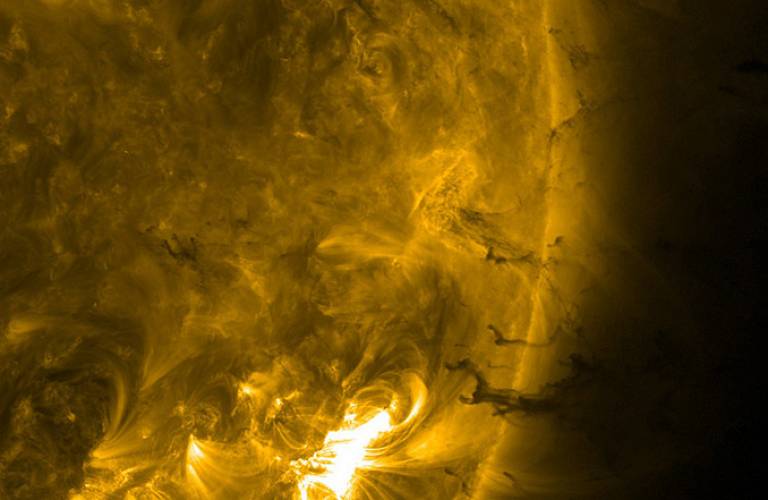Understanding solar weather

12 December 2014
Immense magnetic fields in the sun's atmosphere sporadically erupt into the solar system. If these eruptions reach the Earth they can have a major impact on the planet's atmosphere and magnetic field. UCL research into these eruptions is helping better understand the origins of space weather effects on power grids and telecommunications on Earth.
Our reliance on technology such as satellites, GPS and radio communications means that we are increasingly vulnerable to the effects of this space weather.
Research led by Dr Lucie Green (UCL Mullard Space Science Laboratory, MSSL) answered one of the outstanding puzzles in solar physics by unpicking the magnetic configuration of the eruptions from the sun's atmosphere, which she found to be a bundle of twisted magnetic fields known as a flux rope. Research by colleagues Dr Sergei Zharkov and Dr Sarah Matthews built on these results and discovered that the eruption of flux ropes can also trigger sunquakes, extremely powerful seismic events that penetrate into the Sun.
As space weather has the potential to disrupt power grids and telecommunications on Earth, the insurance industry is interested in the findings. Dr Green's talks to companies about studying the eruption of flux ropes and their potential for predicting space weather help the industry to better understand the potential effects and what steps they need to take to minimise these effects. She is also in regular touch with the Met Office's space weather team. Academics from UCL MSSL are teaming up with the Met Office to aid them in their interpretation and use solar data for forecasting space weather. Researchers are also working with industry to develop a UK space weather satellite that would gather improved data needed for space weather forecasting.
Dr Green frequently appears in the media to discuss physics research and its relation to space weather and solar system physics. Since early 2013, she has been a co-presenter on the BBC's The Sky at Night programme, and also presented Solar Max, BBC Radio 4 programme on the dangers to Earth from space weather.
UCL MSSL as a whole also carries out extensive work promoting science education. Staff deliver special talks at primary and secondary schools throughout the year, with one teacher noting how "invaluable" it was to students to meet "cutting-edge inspirational scientists who have a passion for their subject". UCL researchers have developed a series of teaching resources to provide teachers with practical ideas for bringing solar system science into the classroom.
Talks by researchers at teacher training events cover the basics of the sun as well as information about observing the sun from space - using missions for which UCL MSSL has supplied instruments. These events help connect teachers with expert speakers who not only provide information about current developments in space science but also suggest ways to use this information in the classroom.
Image
- The 7 June 2011 coronal mass ejection, as seen by NASA's Solar Dynamics Observatory. Courtesy of NASA/SDO.
 Close
Close

